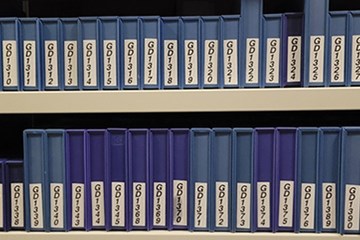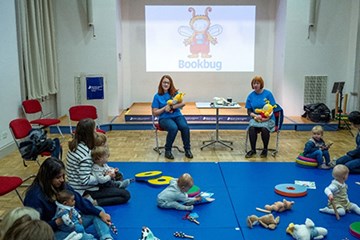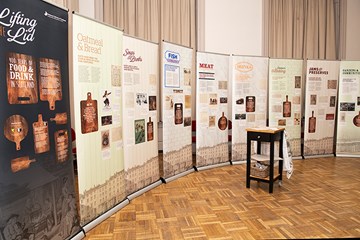Improving access

Maps digitisation
We have made more than 13,000 additional online maps of Great Britain available, including several important Ordnance Survey (OS) series, as our scanning programme steadily expands in its geographic scope.
We've also added new LiDAR (Light Detecting and Ranging) coverage of Glasgow, Edinburgh and the Sherwood Forest.
All can now be viewed online on our Maps website.
Millions learn about our rare manuscripts
In 2022 we digitised more than 240 rare manuscripts and released the news to the media.
The results were outstanding and this became one of the year's biggest media stories for the Library, with a reach of more than three million people in the first day of coverage.
The entire collection contains many medieval Scottish and international items from the 9th to the 16th century, which can be viewed on our Early manuscripts page.
With thanks to Alex Graham, who committed the funds for this ambitious project in 2017 following a tour of the manuscripts stacks.

Collections on tape
This ongoing project is preserving the Library's audio-visual magnetic tape collections. The aim is to preserve 10,000 video and 3,000 audio items.
Magnetic tape is vulnerable to degradation, obsolescence and a range of diseases with interesting names and acronyms, such as Sticky Shed Syndrome and LOL (Loss of Lubricant).
Various formats have been preserved so far – from one-inch open reel and U-matic to Betamax and VHS – and the content includes amateur films, television programmes and even official publications for the opening of the Scottish Parliament, with soundtracks in English and Gaelic.
More than 500 digitised moving image records have gone online, with a focus on the MG Alba Gaelic broadcast collection. Highlights include teen magazine series '@ ÌRE' and current affairs flagship 'Eòrpa'. There are also recordings of communities expressing voices that may not have been heard much before.
This project has been supported by ScottishPower Foundation, Bòrd na Gàidhlig for Cinema Sgìre and the Gaelic Language Promotion Trust, with thanks.
National Bibliography of Scotland
We have updated the National Bibliography of Scotland (NBS) dataset, which now has more than 400,000 records.
This was the first time we had created a new version of a dataset and it posed challenges around the best practice for use of Digital Object Identifiers (DOIs). However, we now have a system in place for future updates and for updates to other datasets.
The NBS dataset will be updated annually.
Maps transcription project
This project, in collaboration with the British Library, set out to transcribe all the names on the Roy Military Survey Map of Scotland (1747 to 1755).
Some 415 volunteers registered an interest and, within the first four weeks of the project, all 33,522 names had been transcribed.
All names and related text entries from the Roy Map are now fully searchable, providing a cartographic resource of huge value for local and family historians, place-name researchers and all those people who are interested in the landscape of 18th-century Scotland.
Revamped 3D map viewer
Our popular 3D map viewer has been updated, allowing any of our more than 600 georeferenced map layers to be viewed from a bird's eye perspective.
The open-source map software makes it easy to incorporate improvements, such as faster and clearer graphics rendering, plus presentations of your own height, tilt, angle of orientation and distance to the centre of the view.
While many areas of Scotland look extremely impressive and fun to fly over, the 3D viewer is also useful as an educational tool for enhancing and illustrating the different historical ways that relief has been presented on maps.
This year's intake includes:
- Total intake: 2,484,183
- eBooks: 96,871
- eJournal articles: 2,215,182
- Books: 51,065
- Serial issues: 54,944
- Newspapers: 18,011
- Maps: 741
- Other: 47,369
Supporting Learning, Research and Discovery

Bookbug sessions
Monday mornings have looked very different at George IV Bridge over the past year, since we started hosting Bookbug sessions.
There are stories, songs and rhymes for babies and toddlers, with up to 12 families taking part each time. Older siblings are also welcome.
Bookbug is a long-standing Scottish Book Trust initiative which aims to increase children's exposure to books, support bonding between parents/caregivers and children, and improve literacy and social development.
There are plans to introduce monthly Gaelic and Scots language sessions at the Library, working with partners including Comann nam Pàrant and the Scots Language Centre.
Women's archives workshop in partnership with the University of Glasgow
We hosted two hands-on workshops at George IV Bridge with postgraduate students from the University of Glasgow's MSc in Gender History course. The workshops were tailored for their dissertations, using women's lives as a lens to look more closely at gender in 19th and 20th century Scotland.
The material sourced from our collections represents the depth and variety of our archives relating to women – from political pamphlets and reports, bookshop catalogues, suffrage postcards and knitting patterns, to private diaries, letters, commonplace books and travel sketchbooks.
Workshop discussions raised insightful questions about different forms of 'silence' in the archives, the role of gender and intersectional social categories such as class, and how these determine what records were created to document women's lived experiences.
Young people and civic literacy
We welcomed 12 students from the Scottish Youth Parliament to the Library to promote civic literacy among young people. They designed bookcase displays as part of their project about Article 12 of the UN Convention on the Rights of the Child – the right to be heard.
Interns from the John Smith Centre for Policy Studies also visited us. The centre seeks to promote careers in public service to young people from all backgrounds. The students took part in a show and tell session featuring items from the official publications collections.
We also worked with Young Scot on a successful social media campaign during Global Media and Information Literacy Week, to help young people feel more confident about identifying fake news and misinformation.
Reaching people in Scotland's towns
An initiative called 'Community Walking' took staff to Dumfries, Perth and Greenock.
Visiting the prisons, schools, colleges and public libraries in these towns, the expeditions were cemented together with a range of pre-arranged and spontaneous visits to a wide range of community centres and projects, public spaces and businesses.
Altogether, the visits have connected with around 60 organisations in these three towns. These two-day visits allowed for many things to happen, chief among them the opportunity to introduce and demonstrate how much of the Library is freely available to people in the towns without having to come to our buildings. Our staff also heard about the information and inspiration needs of particular projects, community organisations and potential new audiences.
It was also a great opportunity to collect local publications and ephemera that we might never have known about as part of our work to collect the recorded memory of Scotland.
Refugees and Displaced People display
We marked Refugee Week in June 2022 with a dedicated display at George IV Bridge and the screening of a documentary, 'Escape to Freedom', from our Moving Image Archive.
Other activities focused on Scotland's complex history – and present – as a home for displaced people seeking refuge from war, persecution and poverty. These included a display on Scottish South Asian Voices in Broadcasting and a one-day symposium on Scotland's Lascar Heritage, held at Kelvin Hall.
We also worked with the charity The Welcoming to offer family workshops for refugees, asylum seekers and people new to Scotland. These events featured storytelling and crafts with a 'treasures' theme to link with our permanent exhibition, 'Treasures of the National Library of Scotland'.
More than 60 people attended over three days and we welcomed women and children from Women's Conversation Space (mainly Syrian refugees), Afghan Women's Group and other people who use The Welcoming's services.
Family workshops – English and Gaelic
Working in partnership with the City of Edinburgh Council, we delivered a Gaelic engagement project for schools, which featured activities such as family workshops and a summer concert.
Pupils from Edinburgh's Bun-sgoil Taobh na Pàirce took part and the event was attended by 17 schoolchildren and 50 friends.

Touring displays programme returns
We have been working with venues across Scotland to resume our touring displays programme following the Covid pandemic.
'Lifting the Lid', about Scotland's food and drink, was at Montrose Museum for three months, while 'Going to the Pictures', about Scottish cinema, went to Irvine Library.
Repairs have been carried out on a third display, 'You Are Here', while a new display on the MacKinnon Photography Collection has been added to the programme.
Funding for the MacKinnon Photography Collection display was provided by the National Lottery Heritage Fund.
